Top Tips from Oslo
Lucia studied History and spent Semester 1, 2021-22 in Oslo, Norway. She kindly wrote this blog post with her advice and recommendations for studying abroad in Norway and elsewhere.
Studying Abroad in Norway – History at the University of Oslo
Norway has such a hold on my heart. I absolutely adored my time there. Here’s some of my top tips for making the most of your Study Abroad, whether Norway or elsewhere.
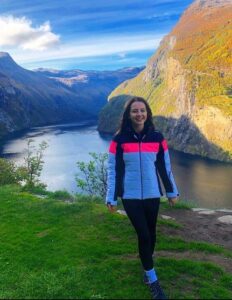
Get involved in Buddy Programmes
Gratefully, the University of Oslo set up Buddy Groups; this connected Erasmus students to other students from their home countries. It was lovely to have the support of people who were in the same boat as me. We discovered the city together through day trips, activities, and nights out.
If your University doesn’t offer this, try to join Facebook and WhatsApp groups and see if you can meet people through there!

Get involved with Societies
One of the best decisions I made abroad was joining Student Societies, such as an Orchestra. I got to play Norwegian music and learn a new instrument. More importantly, though, I got to meet lots of Norwegian students who introduced me to the city, taught me some of the language, and really welcomed me into University life. They even offered events such as a formal and a cabin trip – a great opportunity!
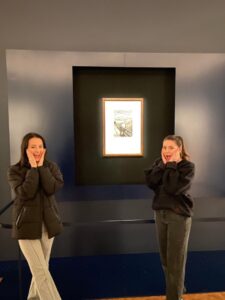
Talk to your Tutors
A new academic system isn’t easy on anyone. Fortunately, my History classes, taught in English, were well tailored to international students. It was so helpful for me to discuss with my tutors what they wanted from assignments. I also explained the grade conversion process right at the beginning, so that they knew what they needed to do before I left. The wonderful thing about studying your discipline abroad is that you gain a greater perspective of its global impact. I found it so interesting to discuss ways in which my international classmates understood history and history-writing. An incomparable experience to learn!
Accommodation
This could be different for everyone, but I am so glad I lived in Student Accommodation. I lived amongst other international students, which was a great way to make friends, and it was certainly easier than organising a room myself. In Oslo, the Student Accommodations are all quite centrally-located, near T-banen stops, making it easy to get around.
Transport
The App ‘Ruter’ is a must-have for tickets – bus, T-Banen, trains and – funnily – even ferries if you fancy going island-hopping at the fjord! It offers student discount as well. Transport in Norway is typically reliable and efficient.
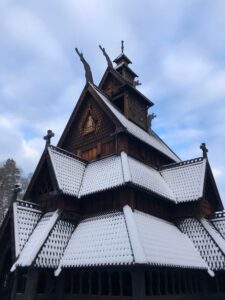
Budget
If you’re heading to Norway, there is one thing to note: It is expensive. The Global Office offers great scholarships, so feel free to reach out to hear more about those! In Oslo, I often bought clothes at weekly loppemarked. These were so cheap, and held in local schools to raise money for their extracurriculars. (It was certainly helpful in the Wintertime, when I realised that Scandinavian weather would mean I needed an extra few coats…)
Many students in Oslo often go to Gronland for cheaper groceries.
It can be tempting to receive packages from home, but often there are import fees to pick these up, which I believe can be up to half the cost of the contents of the parcel! Something to be aware of before you ask for too much to be sent from home (it might be better coming in your suitcase!)
Try to see around as much as possible!
I know that the point of studying abroad is to, well, study, but make sure not to miss out on the wonderful opportunities which your placement offers. Spending a weekend at Geirangerfjords, outside of Oslo, was one of my favourite experiences – seeing a UNESCO heritage site and hiking up one of the most famous hikes in the world was indescribable. When wintertime came, and the cold weather kicked in, ice-skating on free public rinks and frozen lakes became our favourite pastime, along with going to the many, many Christmas markets on offer. Year-round, there are a variety of museums, unique cafes, and art exhibitions to go to. At the end of the day, doing activities like these are what makes the experience memorable. Make sure to make the most of where you’re living 😊
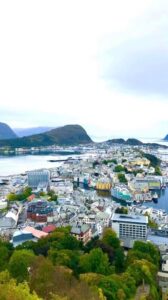
Be prepared
Things go wrong. That’s the easiest way to put it! No matter where you are, there are challenges. The best you can do is try to be as prepared as possible (apply for the VISA as soon as you can, for example) and try to establish a strong support network of contacts. Know that, even though you’re overseas, you can always reach out to people on the home front, be it family, friends, the Global Office team or Student Services. They’re here to help. Remember that you are always part of the St Andrews community, no matter where you go!
The most important thing is to try to make the most of your experience – challenges and all. For example, with a delay in my passport arriving, I had to start the Semester online from home, which felt like such a disappointment. But, when I informed my Buddy Group through WhatsApp, they hosted online activities for me to meet the others. It made it much easier whenever I did move over, that I already had a few friendly faces to greet me!

Try to learn the language
Languages don’t come easily to everyone, and that’s okay. Depending on your placement, you might be able to get by completely in English. In Oslo, I was very fortunate that so many people were willing to speak English. However, I found it so much more gratifying to speak in Norwegian, when I could – Ordering in a café, being able to read public transport notices, and not being completely lost when listening to my Norwegian friends speak! Joining an introductory language course (for me, this was offered for free from my University) is a great way to meet other newcomers to the city and connect with them. DuoLingo is also a lifesaver – surprisingly effective, even the free version!
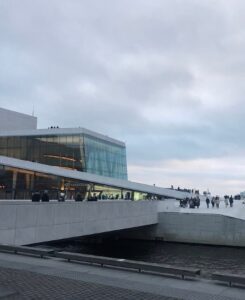
Enjoy!
Studying abroad is an incomparable opportunity to grow and to learn, both about yourself and about the country where you’re living. I am so grateful for my study abroad experience, as I certainly became much more independent and self-sufficient. I gained a lot of confidence in putting myself forward. I made friends from the UK, Norway, and further afield; connections which I hope will last a lifetime. I got to see around the country, experiencing amazing sights such as the fjords. I have gained skills in languages, cultural awareness and communication. I cannot recommend it enough!
Thank you to Lucia for sharing her experience. If you would like to know more about her time abroad, or about study abroad in general, please email [email protected]